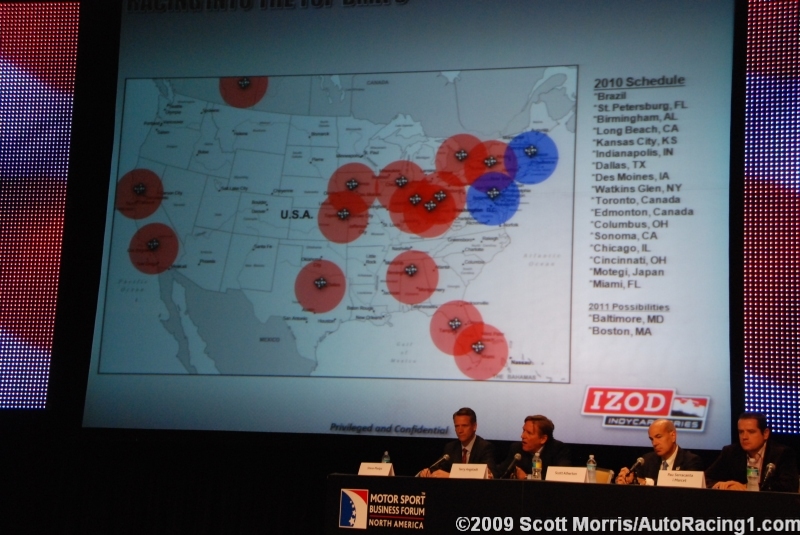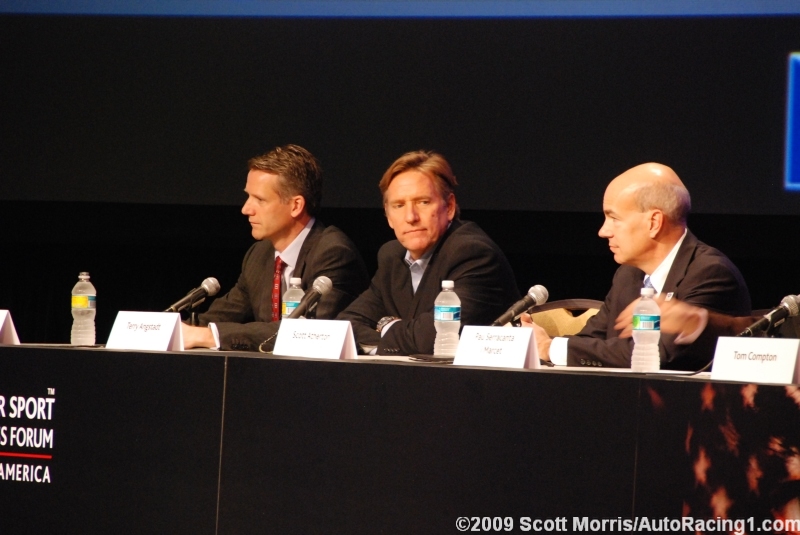Highlights of the Motorsports Business Forum at PRI
 |
| IRL Commercial Director Terry Angstadt talks about the IndyCar Series races for 2010. Note the two new races he is working on for 2011 |
| Scott Morris/AR1.com |
The motorsports industry leaders all converged this morning to speak about the state of the industry at the inaugural Motorsports Business Forum presented by IM2 Events and hosted by Just Marketing International, with some interesting statements made about various arms of motorsports.
After opening comments from Conference Chairman Zak Brown, Just Marketing International (JMI) Founder and CEO, the agenda moved straight into the first of the two day event’s eight scheduled panel discussions, which focused on the State of North American Motorsports. Top executives from leading U.S. and worldwide motorsports governing bodies expounded on their respective racing series while also setting the overall tone for the MSBF-NA in total.
Next to speak was Steve Phelps from NASCAR. Steve was not shy in talking about the drop in ratings and attendance that NASCAR has seen in recent years, and especially in 2009. He said they are engaging fan input, and are addressing a number of points that have been raised by the fans. On the attendance side he stated that the cheaper seats were where the attendance drop was concentrated, while the pricier seats and suits really did not see much change. He mentioned working with their event promoters to make coming to the races more affordable and attractive in challenging economic times. On the television ratings, the only thing he stated was that he feels that going to a set start time for races will improve ratings.
Specifically, he talked about Dale Jr. not running well, and that has clearly impacted their attendance and viewership, and that the series really benefits when he runs well. He said that this is especially true for television ratings, and that when he does well, they see a spike in their ratings. It seems there might be a lot that could be read into that statement.
 |
| (L to R) Steve Phelps (NASCAR), Terry Angstadt (IRL) and Scott Atherton (ALMS) |
| Scott Morris/AR1.com |
Second on the list was Terry Angstadt from the IRL. Terry appeared at this conference in the wake of their recent announcement of Izod as the new IndyCar title sponsor. However, he mentioned their partnership with Apex Brazil as having more than meets the eye, with over 72 business sectors represented under the Apex banner, representing many opportunities for the IRL to forge key relationships. His main comments about Izod were that he is especially proud of the fact that they are not from the automotive or racing industry, and have great potential for activation, which is a big component of their sponsorship plan. He also mentioned that in their contract is a downstream cash flow directly to teams for participation and also enhancement of the prize money package. Finally, Izod also has committed to ongoing utilization of the 2 seat IndyCar feature.
As for new events, Terry mentioned specifically and enthusiastically that the IRL is worked very hard on the Boston and Baltimore markets.
On the new car, Angstadt mentioned that the fancy futuristic looking machine that we have rumored here on AR1 is not likely to be the new car, and that as great and sexy a rumor as it is, there is no secret tunnel in use in the development of the new car. (This secret tunnel has been aptly named "AREA 33" right here on AR1, and we are going to stick to that one like glue because we think there is more to that story. After all, the government still says AREA 51 does not exist…)
During Q&A session, I asked the entire panel which one of them would be most likely to put an all electric racing car on track in competition against IC (internal combustion) cars. ALMS’s Scott Atherton was first to speak up, but Terry chimed in directly after, letting a bit of a cat out of the bag that there is development being done on an electric racing car, with an Indy Lights chassis. He also mentioned that there is a lot of electric and battery technology in the Midwest that they can access for this sort of thing. He left the room with the impression that we might see something surprising in that area, and that they have a number of green developments in the works.
Scott Atherton was the third to speak on this panel, and really, was the only speaker to directly address the topic of “The State of North American Motorsports" The other speakers talked about their series, and there was a bit of a pitch to their presentations that were still informative. But Atherton prepared a piece that was quite insightful about where motorsports is headed right now.
His presence was quite stately, and where much of motorsports management is more casual, this guy is a very polished cut from the modern executive mould. We find this very refreshing.
He talked about all of the things we see in racing in past months being tied to a need for a direct link to the cars that are on the road, with the green factor and alternative fuels and energy being the biggest ingredient. He took aim at the Exxon CEO and talked about how this is shaping the direction they are taking in the ALMS, providing that relevance for the manufacturers that no other form of racing is doing today, all but challenging other series to follow suit. He also mentioned that it should be noted that R&D budgets are far larger than marketing budgets.
During the Q&A, when the panel was asked which member’s series would be most likely to field an all electric racing car on the grid against IC engine cars, Atherton spoke up quickly stating that his series was clearly best pointed in that direction, and they currently have pilot programs that are developing electric racing vehicles, and that the Michelin Green Challenge is something that is just getting started and will be a major part of ALMS competition going forward.
I had a chance to chat casually with him one-on-one at the coffee break and confirmed a conversation I had with Doug Fehan from Corvette Racing that it is not really funding or even technology that is keeping an all electric racing car from happening. It is more safety than anything else. The safety considerations are entirely different from those for fuel-driven cars, and they don’t see any immediate solutions for this. However, hybrids are currently racing and they expect to see and encourage more of them, as manufacturers have shown interest. We think that with the KERS technology being proven in F1 and with KERS packages available for sale, we could see a lot more hybrid racing cars on the grid soon.
Pau Serracanta gave a brief presentation on MotoGP and talked about the growth of the series, with the value it presents to sponsors and access to a global market. He also mentioned the significance of the Indy race to MotoGP and that the history of their sport is really rooted at Indy, as the very first race held on the IMS grounds was a motorbike race; of which many people are surely unaware.
Tom Compton gave a brief presentation on the NHRA and talked about their business model, and that they currently represent the best value in motorsports. He also highlighted the accessibility of their teams and drivers to the fans and that every single ticket to one of their events includes access to the paddock area. At the same time, the NHRA is not a series that needs to evolve. It is a primal appeal that has a solid fan base. He said that thus far, the economic environment has not presented any major challenges to them.
Finally, we got to hear from Roger Edmonson of Grand-Am, which was acquired by NASCAR fairly recently, from the original group of 25 investors. This business model is intriguing to us here at AR1 because we don’t understand how someone can run a series for 10 years that still has painfully obvious empty seats and forgettable television ratings. So, we were very interested to hear what he had to say. Some of it seemed to make sense, as to the motivations of their series, especially as compared to the ALMS.
Edmonson said that Grand-Am is all about the American style of road racing, and that is why the ownership by NASCAR is the right fit. It is a bumping and banging kind of racing, where the cars are less of an emphasis. They want their drivers and the teams to be the “pure racers" in the motorsports world, and they have no interest in the high-tech approach. They see their series as an entertainment option for fans, which also makes it a good pairing with NASCAR.
All of that said, we understand their approach, but still do not understand the viability. How long do you run a series like that and lose money? Is it simply because the France family just has a deep seated love for sports car racing? Hmmmm, you gotta wonder.
The opening panel was followed by an insightful discussion and overview on North American Media – Delivering Motorsports to the Mass Market which featured top level executives from premier media outlets that focused on the ever changing and positive aspects of major media in motorsports.
“It is unique, motor racing is unlike any other thing we do, the complexity of it and the live action all of the time," said John Wildhack, Executive Vice President Program Acquisition and Strategy for ESPN/ABC. “It’s the most incredibly loyal fan base there is, across any sport."
Despite being a first-time event, the inaugural MSBF-NA has drawn a quality cross section of delegates from North America and beyond.
“We are very pleased with the initial number of delegates for our first North American Forum," said Simon Berger, Founder and CEO of IM2 Events, which owns and organizes the worldwide MSBF series. “The initial participation is very encouraging and is actually slightly more than the first edition of our flagship Monaco Forum which has now grown to over 700 delegates for this year’s event, which begins tomorrow. Without question, we see the potential for similar growth with the North American edition in the coming years as well. We are off to a great start."
Berger also touted the blue-chip caliber of the MSBF-NA’s line up of panelists as being a prime factor in the successful debut.
“This is as good a line up for a Motor Sport Business Forum as we have ever had," Berger said. “We are deeply grateful to all of the top executives that have taken the time to join us and equally as pleased that so many delegates have turned out to hear what they have to say."
